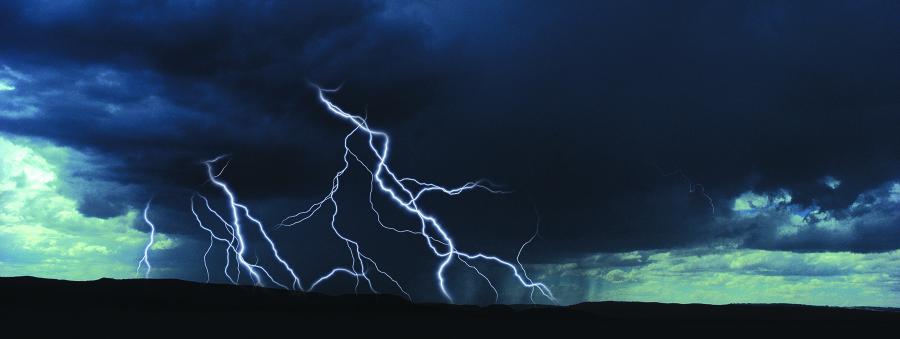Be Prepared for Storms!

Q: Why does my neighbor have power and I don’t?
A: There are several reasons this can happen. First there may be damage to the service wires leading only to your home. These would not affect your neighbor’s electric supply.
Second, your neighbor’s home may be served by a different circuit or feed than your home, even though you are right next door. The homes and businesses on our system are not connected in series like the dot-to-dot game you played as a child/ rather they are connected more like a spider web that crisscrosses from place to place in a seemingly random way (even though it’s not random at all!).
Besides different circuits or feeds, there may also be as many as three different “hot lines” (phases) on a pole in front of your home. Your neighbor may get service from a different “hot line” than you. A problem down the street that’s served by the same phase as your home could be keeping the power off for all homes attached to that particular “hot line.”
Q. A truck drove right by my house and didn’t stop to restore electricity. Why?
A. The crew you saw was probably working on getting the backbone of the electric system repaired. Our first priority in an outage after making sure the substations are functioning is to get the main circuits back in operation. It would be futile to repair the wire leading to your home if there’s still no electricity on the street.
Keep in mind that not every wire out on the street is considered a main circuit. There are thousands of lines that feed off of main circuits. After the main trunks are “back hot”, we start repairing the taps. After trunk lines are functioning, we make repairs that affect the most people at one time. This means that repairs that affect only one or two locations will probably be last.
Q. I’m on the priority list because of a medical condition. Why isn’t my power restored immediately?
A. Unfortunately, Mother Nature probably won’t ever allow us to guarantee your electric service. Things beyond our control will always tear down power lines and disrupt the flow of electricity.
That’s why members who depend on electrical equipment for a medical necessity should always have alternate plans in place in case the power goes out for an extended amount of time. It just makes good sense. And even though we give these accounts priority, we still must repair damage to the backbone of our system before we can turn our attention to individual priority accounts.
Q. I have underground wires to my house. Why did my power go off?
A. Even though the wires coming into your home are buried, overhead wires bring electricity to those underground wires from the substation. Additionally, in areas that are prone to flooding, underground equipment can become damaged once submerged. If the flood waters are saltwater, it may be necessary to wash out the equipment before normal operation can resume.
Storm Checklist
To report an outage, call Berkeley Electric Cooperative at 1-888-253-4232.
If your lights go off during a storm, be prepared for the power outage. Assemble supplies to have on hand rather than rushing around when the storm is coming and waiting in long lines for milk or bread. Rotate your supplies to keep them fresh and use the following checklist to prepare for power outages:
Have Plenty of Food
-
Keep a 3- to 5-day supply of drinking water in plastic bottles. Plan on at least 1 gallon of water per person, per day.
-
Store a manual can opener with enough nonperishable foods for 3 to 5 days. Canned meats, tuna fish and peanut butter are good foods to store. Don’t forget pet foods!
-
Conserve water by using paper plates and plastic utensils.
-
Have a camp stove or grill for outdoor cooking.
Stay In Touch
-
Have a portable,battery-powered radio and alarm clock.
-
Have one non-portable phone that will work even if power is interrupted.
-
Plan where to meet and how to communicate with family members if separated.
Keep essential family member contact information near your phone, in your wallet, and in your glove compartment.
Keep Things Going
-
Keep plenty of gas in your car.
-
Keep extra batteries, matches, propane, charcoal and firewood.
Stay Happy, Healthy and Warm
-
Coordinate with neighbors for care of the elderly and disabled living alone.
-
Maintain a supply of prescriptions, nonprescription drugs, vitamins and special dietary foods.
-
Playing cards, books, drawing and writing supplies, and board games help pass the time. If you have a video camera and tapes, your family can make a storm documentary.
-
Keep sanitary and personal hygiene supplies replenished. Premoistened cleansing towelettes are useful and help conserve water.
-
Use plastic trash bags and ties for garbage.
-
Put first-aid kits in your home and car.
-
Make sure you have cold weather clothing, foul weather gear, blankets and sleeping bags.
-
Consider purchasing alternative UL-approved heating devices. For example, a fireplace insert or woodstove will keep the heat in your home instead of up the chimney.
-
Use flashlights and other battery-operated lighting instead of candles.
-
Keep fire extinguishers fully charged.
-
Fill your bathtub with water for bathroom use before the storm (if you have a well).
Check to see current weather conditions or current outages.
Don't forget to download a copy of our Storm Safety brochure.
You can also visit the Red Cross for more readiness information on Thunderstorms and Hurricanes.
